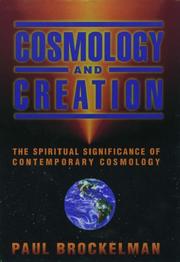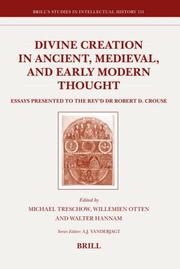| Listing 1 - 10 of 91 | << page >> |
Sort by
|
Book
ISBN: 3658321849 3658321830 Year: 2021 Publisher: Wiesbaden, Germany : Springer VS,
Abstract | Keywords | Export | Availability | Bookmark
 Loading...
Loading...Choose an application
- Reference Manager
- EndNote
- RefWorks (Direct export to RefWorks)
Cosmogony. --- Cosmology
Book
ISBN: 9781930972322 1930972326 193097261X 9781930972612 1282641638 9786612641633 9781282641631 6612641630 Year: 2010 Publisher: Las Vegas Parmenides
Abstract | Keywords | Export | Availability | Bookmark
 Loading...
Loading...Choose an application
- Reference Manager
- EndNote
- RefWorks (Direct export to RefWorks)
Cosmogony, Ancient --- Cosmogonie ancienne --- Plato. --- Cosmogony, Ancient.
Book
ISBN: 1438464614 9781438464619 9781438464596 Year: 2017 Publisher: Albany, NY
Abstract | Keywords | Export | Availability | Bookmark
 Loading...
Loading...Choose an application
- Reference Manager
- EndNote
- RefWorks (Direct export to RefWorks)
Miracles are usually regarded as an intrusion of a supernatural force upsetting the normal workings and laws of the universe, but if one is attentive to the natural world, one can instead find miracles beneath the surface of everyday existence. This outlook is part of Donald A. Crosby's religious naturalism, which he terms Religion of Nature, a belief system that posits the natural world to be the only world, without any underlying or transcending supernatural being, presence, or power. In The Extraordinary in the Ordinary, Crosby explores seven types of everyday miracles, such as time, language, and love, to show that the miraculous and ordinary are not opposed to each other. Rather, it is when we acknowledge the sacred depths and dimensions of everyday existence that we recognize the miracles that constantly surround us.
Miracles. --- Cosmogony. --- Naturalism --- Nature --- Religious aspects.
Book
ISBN: 0830874038 9780830874033 9780830853861 Year: 2018 Publisher: Downers Grove
Abstract | Keywords | Export | Availability | Bookmark
 Loading...
Loading...Choose an application
- Reference Manager
- EndNote
- RefWorks (Direct export to RefWorks)
Creation. --- Biblical cosmogony --- Cosmogony --- Natural theology --- Teleology --- Beginning --- Biblical cosmology --- Creation windows --- Creationism --- Evolution

ISBN: 1280529849 0195353153 1429404523 9781429404525 9780195353150 9780195119909 0195119908 9781280529849 0195119908 0197738737 Year: 1999 Publisher: New York : Oxford University Press,
Abstract | Keywords | Export | Availability | Bookmark
 Loading...
Loading...Choose an application
- Reference Manager
- EndNote
- RefWorks (Direct export to RefWorks)
This text argues that the new scientific cosmology also functions as a religious creation story, or ""cosmogony"". Traditional creation mythologies offer a vision of an ultimately meaningful sacred reality; they show precisely how all of creation emerges from and is situated within that reality.
Cosmology. --- Creation. --- Biblical cosmogony --- Cosmogony --- Natural theology --- Teleology --- Beginning --- Biblical cosmology --- Creation windows --- Creationism --- Evolution --- Astronomy --- Deism --- Metaphysics
Book
ISBN: 0791494020 1441607773 9781441607775 0791493938 9780791493939 9780791494028 9780791494028 Year: 2009 Publisher: Albany : State University of New York Press,
Abstract | Keywords | Export | Availability | Bookmark
 Loading...
Loading...Choose an application
- Reference Manager
- EndNote
- RefWorks (Direct export to RefWorks)
What if our world were considered a gift? Extending postmodern gift theory to ecological and ecotheological concerns, Mark Manolopoulos explores how "creation"—the what-is—can be seen as a gift. Creation, when viewed in a radically egalitarian way, is the matrix of all material things—human, otherwise-than-human, or humanly manufactured. Utilizing and critiquing the work of Jacques Derrida and Jean-Luc Marion, Manolopoulos argues that the gift is an irresolvable paradox marked by the contradictory elements of excess (gratuity, linearity) and exchange (gratitude, return). Philosophical and theological reflections on the gift become entangled in its paradoxical tension, but ultimately both aspects must be respected and reflected. When it comes to the creation-gift, we should vacillate between responses like letting-be, enjoyment, utility, and return. Elegantly written and thought-provoking, If Creation Is a Gift both contributes to the ongoing debate on the gift and provides a fresh philosophical and theological consideration of the environmental crisis.
Human ecology --- Gifts --- Creation. --- Biblical cosmogony --- Cosmogony --- Natural theology --- Teleology --- Beginning --- Biblical cosmology --- Creation windows --- Creationism --- Evolution --- Religious aspects --- Christianity.
Book
ISBN: 1282241958 9786613813077 0253005469 9780253005465 9781282241954 0253357144 9780253357144 0253357144 9780253357144 6613813079 Year: 2012 Publisher: Bloomington Indiana university press
Abstract | Keywords | Export | Availability | Bookmark
 Loading...
Loading...Choose an application
- Reference Manager
- EndNote
- RefWorks (Direct export to RefWorks)
Creation and the Sovereignty of God brings fresh insight to a defense of God. Traditional theistic belief declared a perfect being who creates and sustains everything and who exercises sovereignty over all. Lately, this idea has been contested, but Hugh J. McCann maintains that God creates the best possible universe and is completely free to do so; that God is responsible for human actions, yet humans also have free will; and ultimately, that divine command must be reconciled with natural law. With this distinctive approach to understanding God and the universe, McCann brings new perspectiv
Creation. --- God. --- Metaphysics --- Misotheism --- Theism --- Biblical cosmogony --- Cosmogony --- Natural theology --- Teleology --- Beginning --- Biblical cosmology --- Creation windows --- Creationism --- Evolution --- Creation --- God

ISSN: 09208607 ISBN: 9789004156197 9004156194 9786611920913 1281920916 9047419871 9789047419877 9781281920911 6611920919 Year: 2007 Volume: 151 Publisher: Leiden Brill
Abstract | Keywords | Export | Availability | Bookmark
 Loading...
Loading...Choose an application
- Reference Manager
- EndNote
- RefWorks (Direct export to RefWorks)
Throughout his academic career Robert Crouse has insisted that the patristic and medieval philosophical and theological traditions, which have so profoundly shaped western culture, cannot be understood apart from the subtle and complex dialogue between Christianity and Hellenic culture out of which these traditions emerged. In this volume in Father Crouse’s honour, twenty-two eminent scholars from across North America and Europe examine various moments within the emergence of the doctrine of creation in the patristic and medieval periods, the Hebraic and Hellenic pre-history of this movement, as well as modern reactions to the partristic and medieval syntheses. Student and specialist alike will appreciate not only the depth of scholarly research clearly evident in the individual essays, but also the broad scope of the volume as a whole.
Creation --- Biblical cosmogony --- Cosmogony --- Natural theology --- Teleology --- Beginning --- Biblical cosmology --- Creation windows --- Creationism --- Evolution --- Philosophy, Ancient --- History of doctrines --- Creation. --- Creation - History of doctrines
Book
ISBN: 0585219451 9780585219455 0836136322 Year: 1993 Publisher: Scottdale, Pa. Herald Press
Abstract | Keywords | Export | Availability | Bookmark
 Loading...
Loading...Choose an application
- Reference Manager
- EndNote
- RefWorks (Direct export to RefWorks)
Human ecology --- Nature --- Creation. --- Creation --- Christianity --- Religion --- Philosophy & Religion --- Biblical cosmogony --- Cosmogony --- Natural theology --- Teleology --- Beginning --- Biblical cosmology --- Creation windows --- Creationism --- Evolution --- Religious aspects --- Christianity.
Book
ISBN: 0813219299 9780813219295 9780813217987 0813217989 Year: 2011 Publisher: Washington, D.C. Catholic University of America Press
Abstract | Keywords | Export | Availability | Bookmark
 Loading...
Loading...Choose an application
- Reference Manager
- EndNote
- RefWorks (Direct export to RefWorks)
Creation --- God (Christianity) --- Biblical cosmogony --- Cosmogony --- Natural theology --- Teleology --- Beginning --- Biblical cosmology --- Creation windows --- Creationism --- Evolution --- Christianity --- Trinity --- History of doctrines --- Omnipotence
| Listing 1 - 10 of 91 | << page >> |
Sort by
|

 Search
Search Feedback
Feedback About UniCat
About UniCat  Help
Help News
News